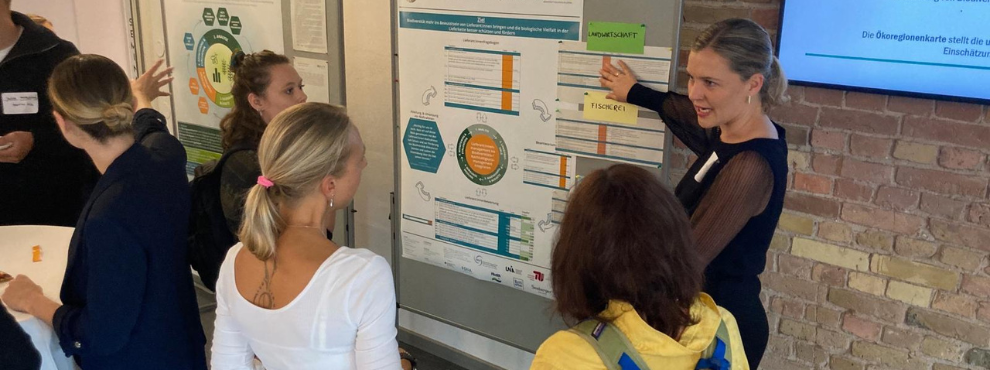Final conference of the BioVal research project
Demands for sustainable food production and the protection of biodiversity

After three years of intensive research, scientists and practice partners from the food industry are presenting their results in Berlin.
The focus is on the question of how the negative effects of food production on biodiversity can be reduced and how positive effects can be developed. The project was funded by the Federal Ministry of Education and Research (BMBF).
Background and aim of BioVal
The BioVal research project has set itself the task of protecting and promoting biodiversity in the food value chain. Through the development of instruments and management tools, the protection of biodiversity is to be firmly anchored in companies. The scientific institutions Centre for Sustainable Leadership (ZNU) at Witten/Herdecke University, the Centre for Technology and Society (ZTG) at the Technical University of Berlin and the University of Augsburg as well as the three companies Ritter Sport, FRoSTA and Seeberger are involved in the project.
Dr Ulrike Eberle, BioVal project manager at the ZNU, emphasises:
"Companies have a great responsibility to align their business models with sustainability. The protection and promotion of biodiversity should be at the centre of their efforts. The impact of the food industry on the loss of biodiversity is immense - probably even greater than the impact on climate change. The threat to humanity from biodiversity loss is at least as great as that posed by climate change. Everyone is talking about climate change, but so far only a few are talking about biodiversity. That urgently needs to change."
Appeal to politicians
As part of the final conference, an urgent appeal is made to politicians. In an open letter handed over to the Chairman of the Committee on Food and Agriculture of the German Bundestag, Mr Hermann Färber, the BioVal team calls for three key measures to protect biodiversity:
- Mandatory rules for companies to protect biodiversity
Companies should be obliged to establish biodiversity as an integral part of their reporting and corporate strategies, with clear targets, indicators and annual progress reports. Clear legal requirements are necessary to make the protection of biodiversity binding for all companies. - Internalisation of environmental costs
The use and pollution of nature and biodiversity must have a price. External costs arising from the destruction of nature should be integrated into the market. To this end, the BioVal team is calling for the development of instruments that hold companies accountable and internalise the costs of environmental damage. - Rewarding conservation measures by agricultural and fishing businesses
Companies that take measures to protect biodiversity should be appropriately remunerated. Remuneration for ecosystem services, such as the restoration of biodiversity, must be linked to clear, binding criteria in order to create long-term incentives.
The full appeal is available for download.
Concrete results and measures of the project
Together with the three companies, BioVal has developed concrete instruments to manage biodiversity along the supply chain. These include
- The practical handbook "Biodiversity Management", which provides concrete instructions on how biodiversity can be integrated into sustainability management and which addresses the instruments developed in the project.
- An ecoregion map, which shows the different value of different ecoregions worldwide and can be used to obtain an initial assessment for sourcing regions with regard to the risk of generating negative impacts on biodiversity or, conversely, with regard to the opportunities to achieve something good for biodiversity conservation.
- Questionnaires to enable a comparative assessment of suppliers with regard to their commitment to biodiversity conservation.
- A dashboard to quantify the impact of food production at product level (BVI method) and derive concrete measures from this.
- a module on how the protection of biodiversity can be anchored in the Code of Conduct for suppliers.
- a set of slides for internal training courses to raise awareness of the importance of biodiversity protection. The slide set contains facts about the importance of biodiversity, especially for food production, but also shows concrete options for action.
All instruments were also trialled by other companies from the project's biodiversity working group.
Statements from the partner companies
Ralph Beranek, Managing Director of Seeberger, emphasises the importance of biodiversity in the procurement process:
"As a company that specialises in natural products from sustainable agriculture, we consider biodiversity to be an integral part of our supplier management. Through long-term partnerships, often spanning decades, we are able to promote and protect biodiversity together with our global partners in agriculture and food production. In this way, we combine ecological responsibility with economic success."
Felix Ahlers, CEO of FRoSTA, explains:
"We want to include biodiversity in our decisions. We will therefore integrate biodiversity impacts into the calculation of the ecological footprint of our products so that we can identify biodiversity-related risks and opportunities and make informed decisions. This enables us to minimise negative impacts, maximise positive contributions to biodiversity and make our progress measurable. In this way, we strengthen our commitment to sustainability and demonstrate responsibility for our environment."
Georg Hoffmann from Ritter Sport adds:
"The BioVal project will enable us to talk to the farmers who produce agricultural raw materials for us about their opportunities to have a positive impact on biodiversity on their land and to do so with academically sound, measurable data."
BioVal - results and outlook
The work of the BioVal team has shown that biodiversity can be successfully integrated into the sustainability management of companies. The tools and methods developed in the project enable the transparent measurement and promotion of biodiversity along the entire value chain. These instruments can be used to make food production more ecologically sustainable.
Photos for download

The ‘Managing biodiversity’ discussion station: Dr Verena Timmer, ZNU, in conversation with participants. (Photo: BioVal)

The panellists in the panel discussion (Photo: BioVal)

Cover picture of the practical handbook on biodiversity management, which was developed in the project (Photo: BioVal)

Handover of the political appeal (Photo: BioVal)
Contact person

Svenja Kloos, M. A.
Team Leader Communication
Administration | Communication & Marketing
Alfred-Herrhausen-Straße 48
58455 Witten
Room number: 2.F05 | 2.028